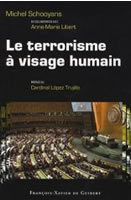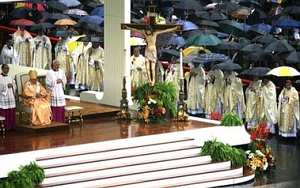Dette er et spørsmål som diskuteres mye i store deler av verden, men lite i Norge. (Bortsett visse kontroverser i Den norske kirke rundt spørsmålet om nattverdnekt for personer som utfører eller aktivt støtter fri abort. Daværende kapellan i Øksnes, Jon Syver Norbye, er her det mest kjente eksempelet, da han i 1992 ønsket å øve kirketukt mot en lege som aktivt støttet fri abort, men ikke fikk støtte av sin biskop.) I USA har man ganske grundig diskutert om katolske politikere som aktivt støtter fri abort fortsatt kan motta nattverden. Og ved pavens reise til Brasil nå nylig ble han spurt om akkurat dette, og svarte bekreftende at slike personer ikke burde motta nattverden. Dette svaret ble så mildnet litt av Vatikanets pressekontor, og mange syntes det var underlig at paven skulle sensureres – av Vatikanet!
I en artikkel: Catholic Politicians and Excommunication på First Things nettsider diskuteres denne saken på en intelligent måte. Det er svært klargjørende at man begynner med det moralske spørsmålet, før man går over til kirkerettslige diskusjoner. Les selv:
To start at the beginning, as a matter of Catholic moral theology (which is prior to any question of canon law), a Catholic who commits a grave sin separates himself from the Body of Christ and imperils his immortal soul. This applies to all grave sins of whatever nature; there is nothing special about abortion here. Until a person who commits such a sin repents and does penance, he ought not receive communion. This is because, Whoever eats the bread or drinks the cup of the Lord unworthily sins against the body and blood of the Lord (1 Cor. 11:27). This is a moral prohibition in moral theology, not a legal punishment under canon law.
Canon law becomes relevant because the Church has chosen to impose penalties for certain forms of wrongdoing in order to create additional incentives for the offender to repent. Such is the primary purpose even of the extreme penalty of excommunication, which denies the subject person access to the sacraments. Now, the Church generally imposes such canonical penalties as the result of a judicial process, much as the state imposes a term of imprisonment through the sentence of a judge. … …
The issue of excommunication persists, however, because canon law treats abortion much more severely than most other kinds of wrongdoing. It imposes on the canonical crime of procuring an abortion a so-called latae sententiae excommunication (canon 1398). An excommunication latae sententiae attaches to the offender merely because he has performed the prohibited action and without any judicial action by the Church—indeed without any further action by anyone whatsoever. The penalty is imposed automatically, or, as an American lawyer might say, by operation of law. Ecclesiastical authority will, at most, take note of the fact that the wrongdoer has incurred the penalty. That is precisely what the Mexican bishops were doing when they said that the legislators voting to legalize abortion had excommunicated themselves, and this is what Pope Benedict was acknowledging as well, at least until the Vatican Secretariat of State decided that, although Pilate wrote what he wrote, Benedict didn’t say what he said.

 Det svenske nettstedet
Det svenske nettstedet  40 000 mennesker var samlet på Petersplassen i dag, i pøsende regnvær – bare paven, noen få av hans medhjelpere og alteret var beskyttet under en baldakin. Det var Treenighetssøndag og kåring av fire nye hellige: Giorgio Preca, Szymon di Lipnica, Karel van Sint Andries Houben og Marie Eugénie de Jésus Milleret. Her tar jeg med deler av pave Benedikts preken:
40 000 mennesker var samlet på Petersplassen i dag, i pøsende regnvær – bare paven, noen få av hans medhjelpere og alteret var beskyttet under en baldakin. Det var Treenighetssøndag og kåring av fire nye hellige: Giorgio Preca, Szymon di Lipnica, Karel van Sint Andries Houben og Marie Eugénie de Jésus Milleret. Her tar jeg med deler av pave Benedikts preken: